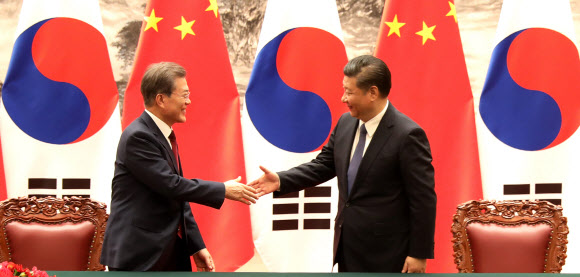 |
|
South Korean President Moon Jae-in shakes hands with Chinese President Xi Jinping prior to their summit at the Great Hall of the People in Beijing on Dec. 14. (Yonhap News)
|
Chinese president says that bilateral relations are “improving at a rapid speed”
While South Korean President Moon Jae-in and Chinese President Xi Jinping reconfirmed the two countries’ disagreement about the THAAD deployment during their third summit on Dec. 14, they appeared to be moderating their tone by avoiding direct reference to THAAD. While the THAAD dispute has evidently not been completely “sealed up,” the two countries seem to have made clear that they do not intend to let this thorny issue hinder them anymore. The first person to allude to THAAD was Xi. Before entering the meeting, he obliquely referred to the THAAD deployment with the phrase “for reasons of which you are all aware” and remarked that “China-South Korea relations have undergone many twists and turns.” Xi went on to say that “I believe [this visit] will prove to be an important opportunity for paving a better path to improve our relations.” “In a certain sense, I think that the temporary challenges that our two countries have recently faced have been a meaningful time for bridging the gap and building a greater relationship since they actually served as an opportunity to see things from the other side’s point of view,” Moon said. “President Xi reiterated China’s position on the THAAD issue and expressed its hope that South Korea will continue to respect this and deal with it appropriately,” the Blue House said in a press statement released after the meeting. This mirrored reporting by state-run China Central Television (CCTV) after the meeting: “President Xi once again mentioned China’s position on the THAAD issue and said he hopes that South Korea will continue to deal with this issue appropriately.” CCTV also reported that President Xi said “in the past there have been several twists and turns in China-South Korea relations for reasons of which you all are aware” and that he “provided a mirror and a lesson about how the two countries can improve bilateral relations in the future on a foundation of respecting each other’s key interests.” Observers have been watching to see in what way, and with what tone, Xi would mention the THAAD deployment issue during this summit. In an agreement aimed at improving bilateral relations that was reached on Oct. 31, the two countries promised to put a “seal” on the THAAD conflict, but China has continued to bring the issue up by asking the South Korean government to implement the “three no’s” (no additional THAAD deployment, no participation in the US missile defense system and no movement toward a military alliance with the US and Japan). During Xi and Moon’s second summit, which was held immediately after the agreement during the APEC Summit in Da Nang, Vietnam, on Nov. 11, Xi defined THAAD as “an issue of very grave interest” and said that South Korea “needs to make a policy decision that can stand the test of time.” In comparison, Xi’s latest remarks about THAAD can be seen as meaningful progress. The press statement that the Blue House released after the meeting quoted Xi as saying, “When you overcome frustration, it takes a long time to recover, but currently bilateral relations are improving at a rapid speed. Let’s manage the situation and pay particular attention to ensure that such a thing does not happen again.” These remarks also seem to move beyond the THAAD conflict to the next level, in contrast with the previous meeting. “THAAD is a strategic issue that must be dealt with on a long-term basis. The fact that the remarks were toned down means that the two sides have found a compromise on the THAAD issue,” said Lee Hui-ok, director of the Sungkyun Institute of China Studies. “This implies that for now they will focus on managing an issue that they cannot immediately resolve, and if that enables them to find new momentum and to strengthen cooperation and exchange, it’s a success,” Lee added. Another hopeful signal was visible in the scenes of the summit broadcast on CCTV on Dec. 14. It’s widely believed in the diplomatic community that the mood of a meeting can be inferred by the expression on Xi’s face that is presented in China’s state-run media, and Xi was smiling in all of the scenes that were broadcast. By Kim Ji-eun, staff reporter Please direct questions or comments to [english@hani.co.kr]






